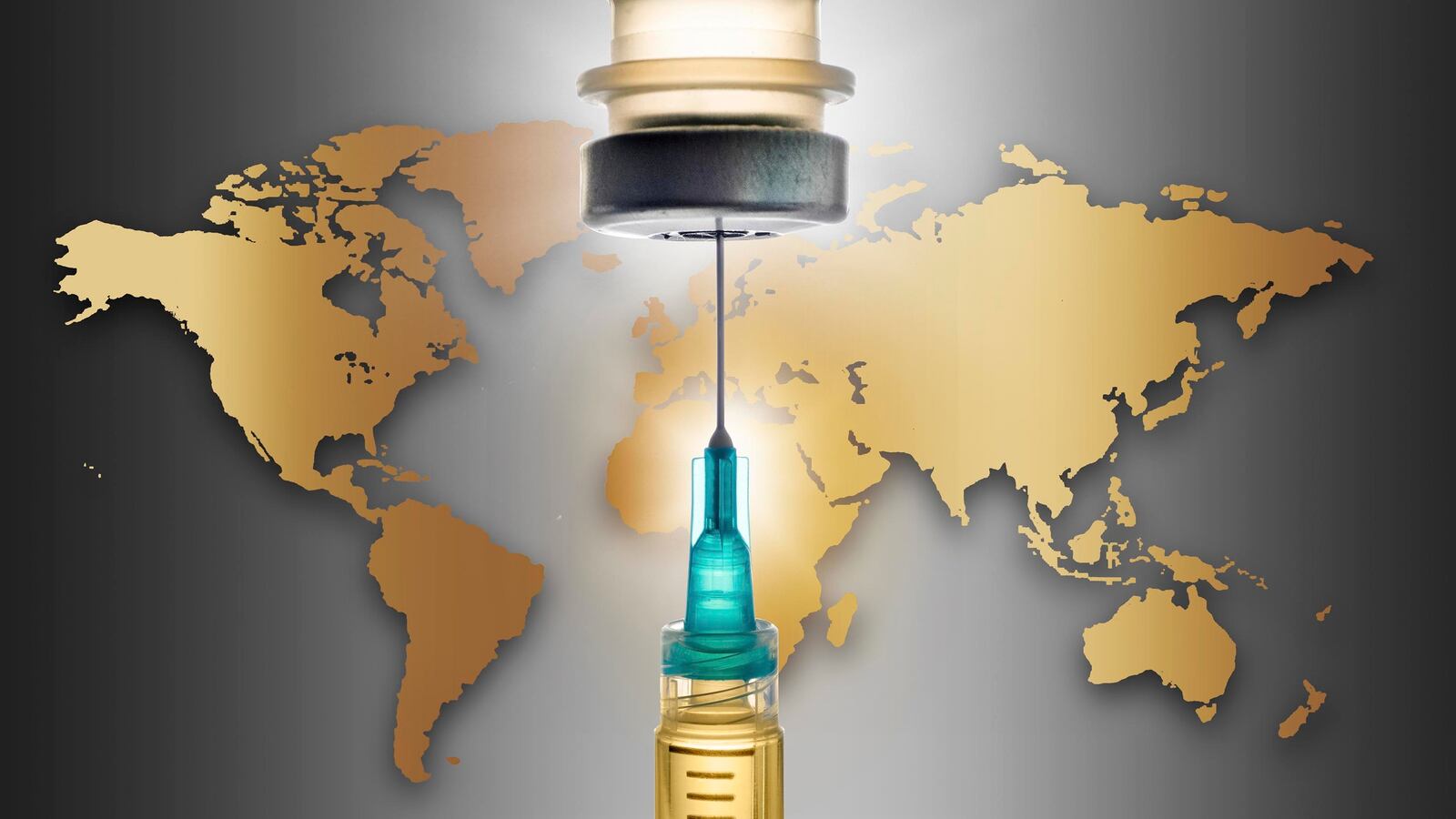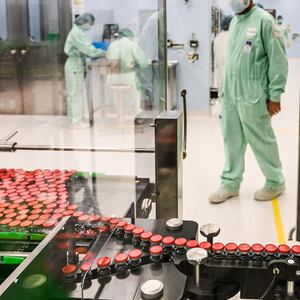The United Arab Emirates has approved a largely untested Chinese vaccine for emergency use, making the vaccine available to health-care workers as the country experiences a surge in COVID-19 cases.
It’s a reckless move, experts told The Daily Beast, one they described as just the latest sign of the global race for a coronavirus vaccine going off the rails. Pushing a vaccine before the completion of large-scale Phase 3 trials risks exposing people to dangerous complications—and, of course, it might not even protect anyone.
Welcome to Rabbit Hole, where we dive deep on the biggest story. It’s for Beast Inside members only. Join up today.
The Emirates isn’t the only country to disregard these risks. China and Russia have also deployed untested vaccines. And there has been a steady drip-drip of evidence that at least some figures inside the Trump administration are considering following their lead.
“Rushing use of unproven vaccines is a recipe for a potential disaster,” Lawrence Gostin, a Georgetown University global health expert, told The Daily Beast. “We need to stick to our guns and complete Phase 3 clinical trials before approving use of our COVID vaccines.”
The UAE’s National Emergency Crisis and Disaster Management Authority announced the emergency use authorization for the vaccine, from China’s Sinopharm, on Monday. “The vaccine will be available to our first-line-of-defense heroes who are at the highest risk of contracting the virus,” the agency tweeted.
The Emirates is experiencing a spike in coronavirus infections. The country registered around 5,500 new COVID cases in the past week, just shy of the 6,100 cases it counted during its worst week back in mid-May.
But the surge in infections doesn’t justify the deployment of an unproven vaccine, Irwin Redlener, the founding director of Columbia University’s National Center for Disaster Preparedness, told The Daily Beast. “It’s not at that level.”
Sinopharm’s vaccine is one of several that authorities in Beijing authorized for emergency use in China starting in July, around the same time the vaccines began Phase 3 trials in the UAE, Morocco, and Peru, countries where the infection rate is higher than it is in China.
Tens of thousands of people in China have been vaccinated since then. And last month, authorities in Moscow approved a separate, Russian-developed vaccine for widespread use before that vaccine had entered Phase 3 trials.
It’s no coincidence that vaccines are being rushed out by authoritarian regimes, Redlener explained. “We’re talking about countries where there’s much more state control over behavior,” he said.
Even so, the Russian vaccine Sputnik V has reportedly met with widespread resistance inside the country.
Small-scale Phase 1 and Phase 2 trials, the results of which appeared in the scientific journal The Lancet this month, did not reveal any major complications in test subjects who received Sputnik V.
But the trials also did not prove that Sputnik V actually works. Test subjects produced antibodies, but it’s unclear whether those antibodies result in meaningful immunity. The same can be said of the vaccines China has authorized for emergency use. “Most experts, including me, have grave doubts about rolling out a vaccine even in a limited way until we have more robust clinical data,” Gostin told The Daily Beast.
Worldwide, at least eight vaccines are in official Phase 3 trials, each of which involves tens of thousands of test subjects and rigorous assessment of the vaccine’s safety and effectiveness. U.S. authorities have long said that it could be the end of the year or later before the Food and Drug Administration (FDA) can approve a vaccine for widespread use in the United States. It could take months longer to actually vaccinate large numbers of people.
It’s possible some of the vaccines will prove to be unsafe, ineffective, or both. Just last week, authorities in the United Kingdom ordered U.K. pharma AstraZeneca to pause Phase 3 trials of its vaccine after a test subject reportedly suffered temporary spinal cord damage, possibly as a result of inflammation. It’s not clear yet whether the inflammation was caused by the vaccine.
AstraZeneca’s AZD1222, which the company is developing along with Oxford University, is one of six vaccine candidates receiving major financial backing from Operation Warp Speed, the U.S. government’s $13-billion vaccine-accelerator. The firm resumed trials in the United Kingdom over the weekend, but trials in the United States reportedly won’t resume until mid-week, at the earliest.
“The highest levels of NIH are very concerned,” said Avindra Nath, leader of viral research at the National Institute for Neurological Disorders and Stroke, a division of the National Institutes of Health. “Everyone’s hopes are on a vaccine, and if you have a major complication the whole thing could get derailed.”
On Tuesday, Reuters reported that some volunteers in a Johnson & Johnson Phase 2 trial in Spain dropped out of the project, possibly because of fears connected to the AstraZeneca scare.
Experts said the AstraZeneca halt underscores the potential danger from unproven vaccines, and could serve as a reminder to U.S. officials that their traditional approach to vaccine development—thorough, large-scale testing before deployment—is the safest and best.
With dozens of vaccines in development in the United States, U.S. authorities certainly could rush out an unproven vaccine. But the message from experts on high has been that they won’t, as Anthony Fauci, the embattled director of the U.S. National Institute of Allergy and Infectious Diseases, told ABC News.
“If we wanted to take the chance of hurting a lot of people or giving them something that doesn’t work, we could start doing this, you know, next week if we wanted to,” Fauci said.
Still, there have been signs the Trump administration might lean on the FDA to approve a vaccine before it’s fully tested, perhaps before the Nov. 3 presidential election.
On Aug, 27, Centers for Disease Control and Prevention director Robert Redfield sent a letter to governors “urgently” asking them to expedite applications for vaccine distribution facilities and waive any requirements that might prevent them from being “fully operational” by Nov. 1.
And on Aug. 30, FDA Commissioner Stephen Hahn told The Financial Times he was willing to consider granting emergency authorization for a vaccine before Phase 3 trials are done.
Hahn, for one, quickly walked back his statement. “I can tell you our decision at FDA will not be made on any other criteria than the science and data associated with these clinical trials,” he told CBS News.
Trump himself said earlier this month that a vaccine might be available “sometime during the month of October,” a deadline that’s largely inconsistent with the normal time-frames for Phase 3 trials of most of the leading vaccine candidates.
Albert Bourla, the CEO of Pfizer, said Sunday that his company would know by the end of October whether its vaccine works. If the FDA swiftly approved the Pfizer vaccine, it could be distributed in the United States starting before the end of the year, Bourla said.
That’s the most ambitious timeline that any U.S. pharma company has publicly proposed, and it seemingly contradicts health experts’ longstanding expectation that a vaccine probably won’t be ready until the end of 2020 or, more realistically, early 2021.
The mismatch between Pfizer’s prediction and experts’ assessments highlights what some observers have described as a worrying lack of disclosure on part of the pharmaceutical industry as the pressure mounts to deploy a vaccine as quickly as possible. This even as government scientists and public-health experts have been consistent in vowing not to let something unsafe be released to the public.
“There’s growing concern that transparency we need from companies is not exactly happening,” Redlener said.







